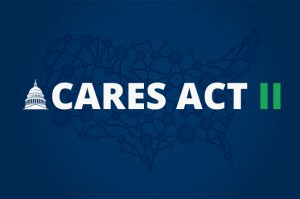 (HARTFORD, CT) – Governor Ned Lamont and Connecticut Department of Labor Commissioner Kurt Westby today provided an update on the Emergency Coronavirus Recovery Act of 2020, known as the CARES Act extension. The law protects Pandemic Unemployment Assistance (PUA) and Pandemic Emergency Unemployment Compensation (PEUC) programs; allocates an additional $300 per week benefit for all claimants for up to 11 weeks; extends the interest waiver for Trust Fund borrowing; and continues 100 percent federal funding for the Shared Work program.
(HARTFORD, CT) – Governor Ned Lamont and Connecticut Department of Labor Commissioner Kurt Westby today provided an update on the Emergency Coronavirus Recovery Act of 2020, known as the CARES Act extension. The law protects Pandemic Unemployment Assistance (PUA) and Pandemic Emergency Unemployment Compensation (PEUC) programs; allocates an additional $300 per week benefit for all claimants for up to 11 weeks; extends the interest waiver for Trust Fund borrowing; and continues 100 percent federal funding for the Shared Work program.
“This legislation is vital to providing stability for both individuals and businesses in the state,” Governor Lamont said. “Tens of thousands were at risk of losing unemployment benefits, but thanks to Connecticut’s Congressional delegation, our residents now know that help is on the way. Our state has been creative and diligent in ensuring our residents who need relief receive it, and we remain committed to getting these programs rolled out quickly. We will work with our residents and businesses to ensure they are using all the resources available to them to make it through these tough times.”
“This is much-needed relief for Connecticut’s unemployed residents,” Commissioner Westby said. “The PUA and PEUC programs alone cover 64,000 people, more than half of whom would lose benefits entirely without federal action. With the Trust Fund and Shared Work provisions, there is an eye on economic recovery as well – keeping workers attached to jobs will be critical for businesses ramping back up. I applaud Connecticut’s Congressional delegation and everyone who worked tirelessly to keep these programs running. They are a lifeline for residents and businesses in our state.”
Key components include:
- For all claimants: A new Federal Pandemic Unemployment Compensation (FPUC) allocation of $300 per week for up to 11 weeks. Claimants can expect benefits by mid-January.
- For around 35,000 PUA participants: An 11-week program extension for a total of 50 weeks. Program eligibility ends March 13, 2021, and last week of benefits is paid by week ending April 10, 2021, for those who have remaining weeks as of March 13, 2021. State labor agencies are waiting for official U.S. Department of Labor (USDOL) guidance on details, however, USDOL has signaled these are expected to be continuous benefits for eligible claimants beginning on the day the CARES Act expired.
- For around 29,000 PEUC customers: An 11-week extension to a total of 24 weeks with the last week paid by week ending April 10, 2021, for those who have remaining weeks as of March 13, 2021. Program eligibility ends March 13, 2021. Claimants who are currently receiving Extended Benefits (EB) will stay on that program until it is exhausted before potentially becoming eligible for the additional weeks of PEUC.
- Trust Fund interest waiver extension until March 14, 2021. This reduces the financial liability for Connecticut companies that pay a special assessment to repay interest on Trust Fund borrowing. Currently, the state has borrowed $485 million for the Trust Fund. The agency has requested $400 million for the first quarter of 2021. This request may not reflect actual spending – weekly spending is currently above $20 million and expected to experience a seasonal increase.
- Extends the 50 percent reimbursement provision for local and state government and nonprofit organizations.
- Extends the 100 percent federal funding for Shared Work. Shared Work helps employers avoid layoffs by allowing them to use unemployment benefits to cover a reduction in hours. During economic downturns, employers can reduce costs but avoid layoffs. Employees stay attached to jobs and benefits even with reduced hours.
State labor agencies must wait for guidance from the U.S. Department of Labor before implementing many new unemployment provisions. Guidance is released in the form of Unemployment Insurance Program Letters that generally come out within several weeks of changes to the law. Since these are extensions of existing programs with operational funding structures, the Connecticut Department of Labor does not expect significant delays on the state side but cannot operationalize the provisions in the absence of federal guidance. Updates on implementation timing and program details will be released and posted to www.FileCTUI.com as they become available.
